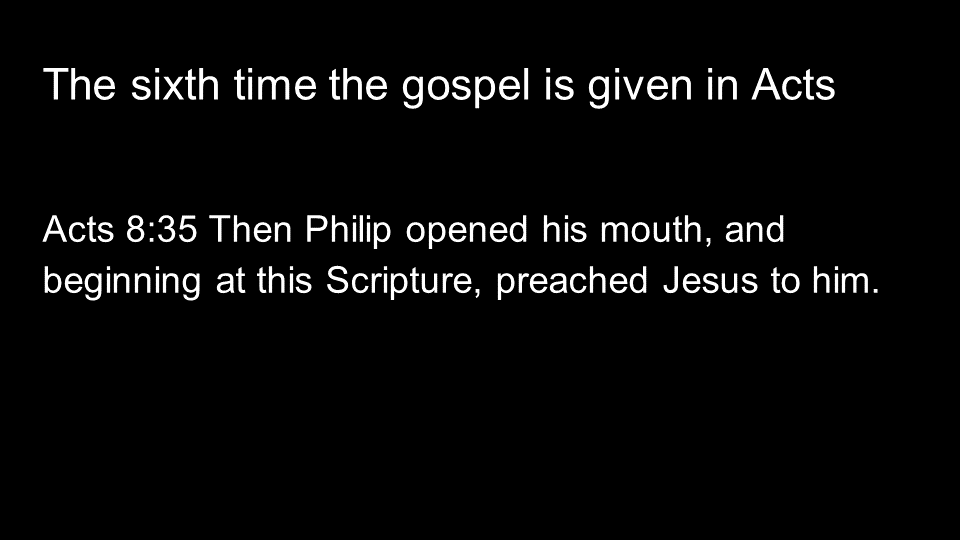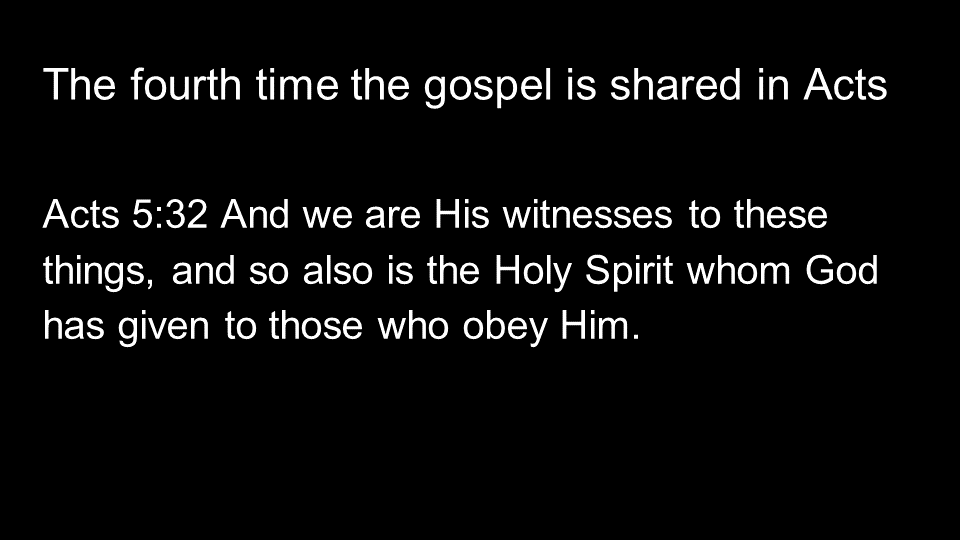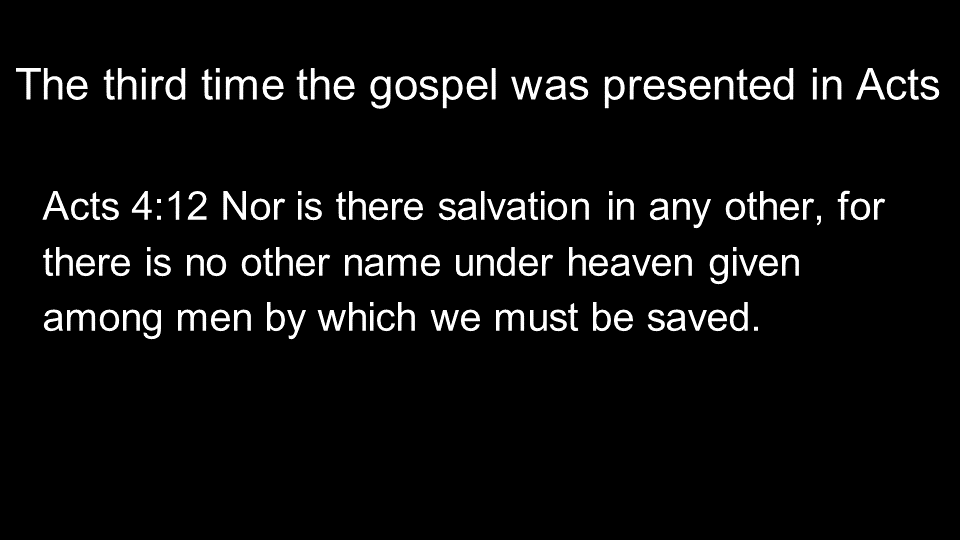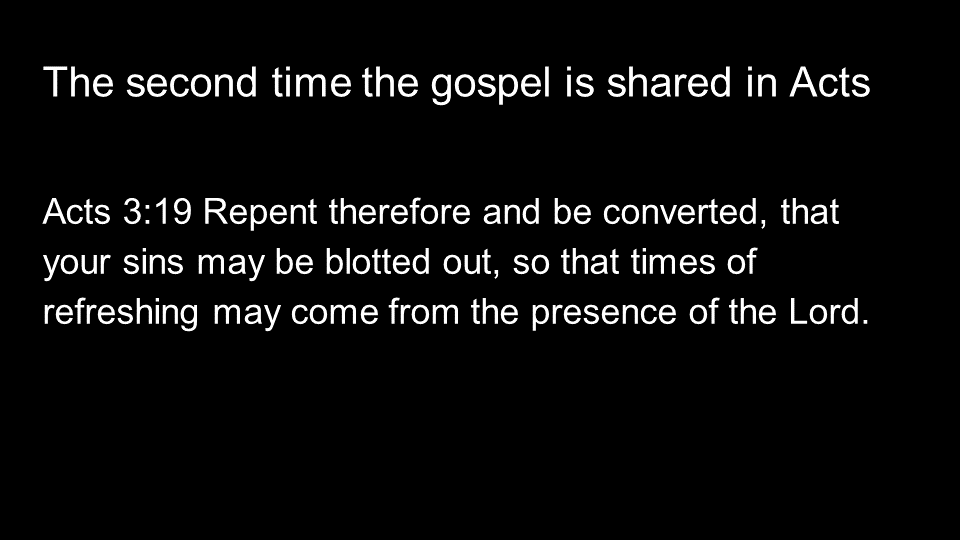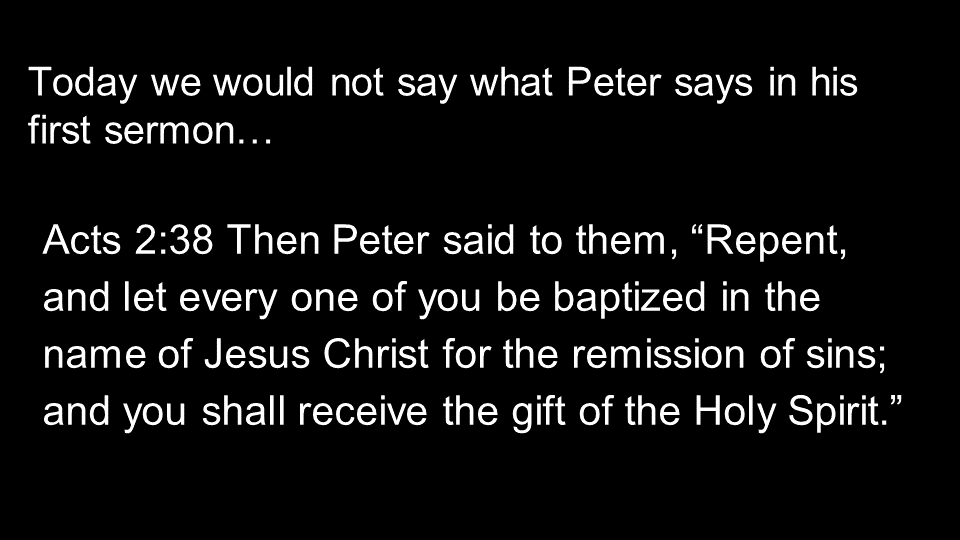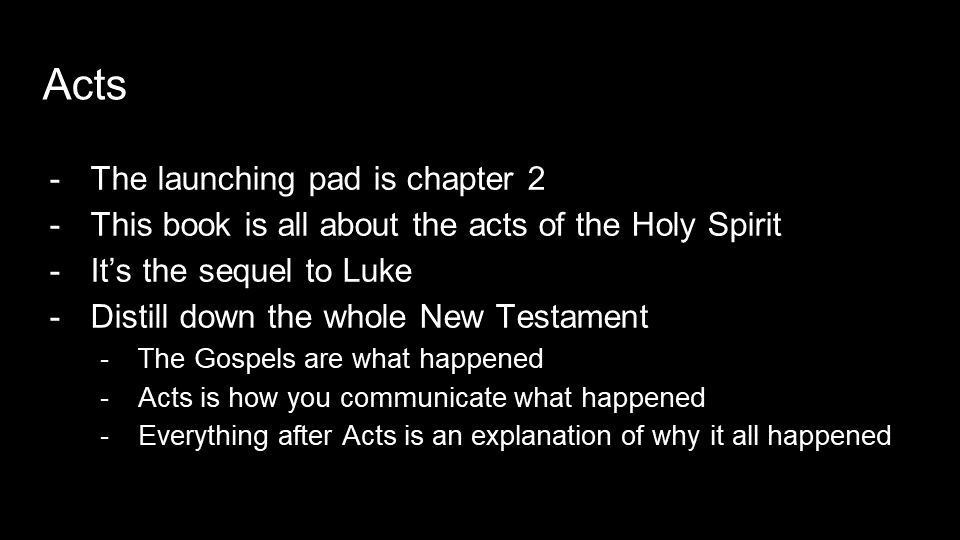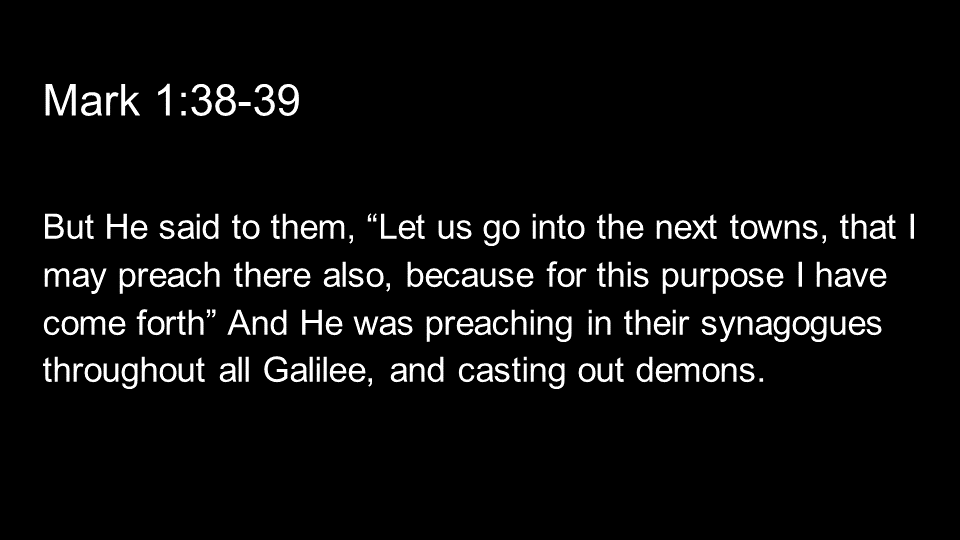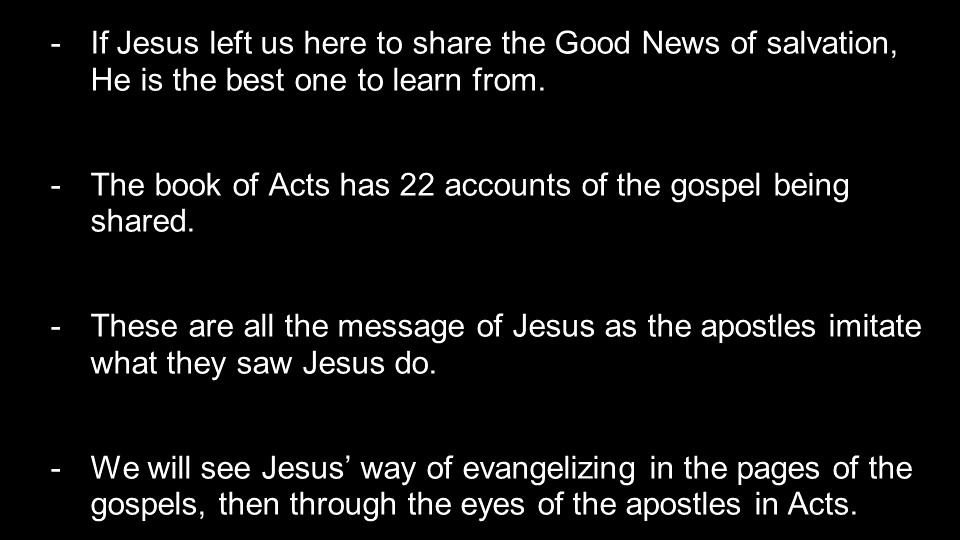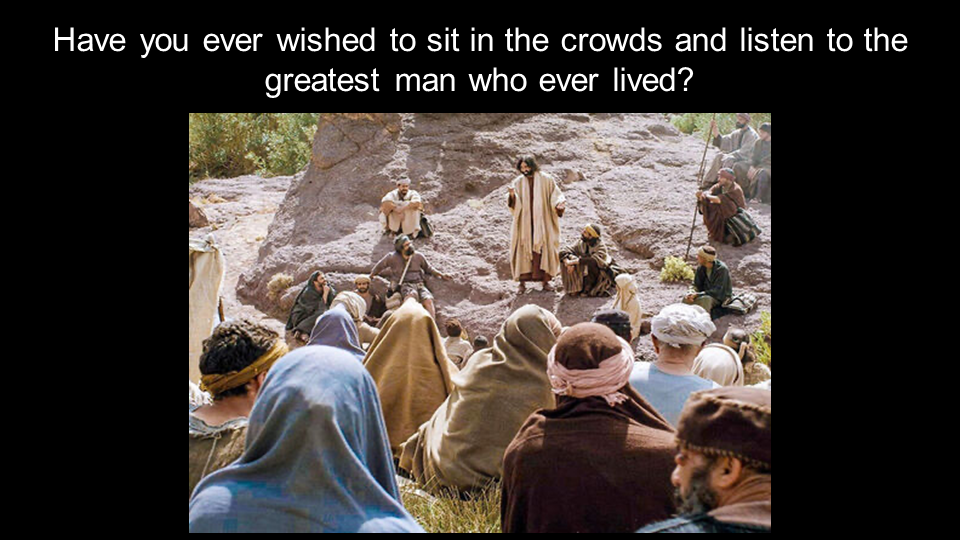MMG-02 NR1-24 NR6-33 WWJ-16
000604PM
Twelve men changed the world. Eleven of them ate, slept, sailed, and walked with Jesus. The twelfth man was a latecomer, so he got three years alone in the desert with Jesus. These men were the apostles, the sent ones, those entrusted with the Gospel of God’s grace. Peter and the eleven together with Paul, the twelfth and final apostle, appear on a divine videotape on evangelism. They demonstrated in public what they had been trained, taught, and commanded to do by Jesus.
Jesus saved them to share the Gospel, the Good News of salvation. Few things are more exciting than to learn from Him, the Master, His message and means for calling men and women, boys and girls to salvation. That is what those fishers of divine souls learned.
As we continue this study of the message of Jesus, remember that Jesus went out preaching in the heavily populated area of Galilee and with Him went twelve tape recorders that captured His words, His passion, and His method. Then He left, asking them to keep up the work of the Gospel. Fanning out to the farthest corners of the Roman Empire, they did so. They blazed the trail for the Gospel to reach untold millions of people from India to Britain, from Russia to Africa. They took Christ’s call seriously.
Remember that reading Acts is like turning on a video that lasts thirty years. Acts is not so much a book on doctrine as it is a divinely recorded and edited video of thirty years of sharing the greatest message ever given by the greatest witnesses ever chosen. The Holy Spirit empowered the apostles to take the Gospel to the world and Acts is like a video report of how the apostles and disciples shared the Gospel message in every possible setting. We get to see how the eyewitnesses shared with the world what happened in the life, ministry, death, and resurrection of Jesus.
In the last lesson we saw the first six of the twenty-two recorded events in Acts where a Gospel message is presented. We found that the Gospel message summary after those six messages on how to be saved is: REALLY REPENT and TURN AWAY FROM INIQUITY, and BE SAVED by RECEIVING FORGIVENESS OF SINS, when you BELIEVE WITH ALL YOUR HEART.
In this lesson we will look at the seventh through twenty-second gospel messages presented in Acts.
The SEVENTH Gospel message is in Acts 9 which records the conversion of Saul of Tarsus into Paul the Apostle. Acts 9:1-6 introduces us to Saul, who becomes Paul, the latecomer, one born out of due time, as Paul later describes himself. The actual record of Christ’s words to Paul is not revealed until Paul’s witness to Agrippa in Acts 26 so we will cover this message in more detail there. Note that those who are saved are called in Acts 9:2 those “who were of the Way.” This description of Christianity, derived from Jesus’ description of Himself (John 14:6), appears six times in Acts (19:9, 23; 22:4; 24:14, 22). This is an appropriate title because Christianity is the way of God (18:26), the way into the Holy Place (Hebrews 10:19, 20), and the way of truth (John 14:6; II Peter 2:2).
The EIGHTH Gospel message, in Acts 10:35-11:18, is TO BELIEVE, TO RECEIVE REMISSION OF SINS, and that GOD GRANTS REPENTANCE.
The NINTH Gospel message, in Acts 11:20-21, is TO BELIEVE in the Lord Jesus and TO TURN to the Lord.
The TENTH Gospel message, in Acts 13:38-39, 48, is FORGIVENESS TO ALL WHO BELIEVE, WHO DO SO AT THE APPOINTMENT OF GOD.
The ELEVENTH Gospel message, in Acts 14:27-15:9, is that GOD OPENS THE DOOR OF FAITH AND PURIFIES THE HEART.
The TWELFTH Gospel message, in Acts 15:19, is to TURN TO GOD AND AWAY FROM WHAT OFFENDS GOD’S WORD AND PEOPLE.
The THIRTEENTH Gospel message, in Acts 16:14, reveals that THE LORD OPENS THE HEART TO HEED HIS WORD.
The FOURTEENTH Gospel message, in Acts 16:31, is TO BELIEVE ON THE LORD JESUS CHRIST.
As a result of the FIFTEENTH Gospel message, in Acts 17:1-7, salvation was described by pagans who observed the process as GETTING A NEW KING OF ONE’S LIFE.
The SIXTEENTH Gospel message, in Acts 17:30, is that GOD COMMANDS ALL TO REPENT.
The SEVENTEENTH Gospel message, in Acts 18:8-13, is TO BELIEVE WHEN GOD DRAWS ONE TO WORSHIP HIM.
The EIGHTEENTH Gospel message, in Acts 19:8-26, included reasoning and persuading concerning things of THE KINGDOM, and FOLLOWING A WAY WHICH PEOPLE FOLLOW INSTEAD OF THEIR OWN WAY. (Isaiah 53:6)
The NINTEENTH Gospel message, in Acts 20:21-25, proclaims REPENTANCE TOWARD GOD AND FAITH TOWARD OUR LORD JESUS CHRIST. The Gospel message is described as TESTIFYING TO THE GOSPEL OF THE GRACE OF GOD (see also Titus 2:11) and PREACHING THE KINGDOM OF GOD.
The TWENTIETH Gospel message, in Acts 24:14-25, describes A WAY OF WORSHIP THAT INVOLVES RIGHTEOUSNESS, SELF-CONTROL, AND AVERTS JUDGMENT that makes the lost to fear. This was certainly not an easy to believe, “try Jesus” message! Let’s look at this message and its audience in more detail. We meet the cast for this scene in Acts 25:13:
Porcius Festus is a little-known figure introduced in Acts 24:27. Unlike Felix, the former slave whom he succeeded, Porcius Festus was a member of the Roman nobility. Little is known of his brief tenure as governor (He died two years after assuming office.), but the Jewish historian Josephus described him as better than either his predecessor or his successor.
King Agrippa (Herod Agrippa II) was the great-grandson of Herod the Great, who ruled at the time Jesus was born and murdered the innocents at Bethlehem in cruel, calculated, cold bloodedness (Matthew 2:1–19; Luke 1:5). He was the grand-nephew of Herod Antipas, the Herod of the gospels who wanted Jesus to do a trick and then mocked Jesus at his crucifixion and to whom Jesus would not even utter a word (Mark 6:14–29; Luke 3:1; 13:31–33; 23:7–12). He was the son of the Herod who killed James and imprisoned Peter. The last of the Herods who played a prominent role in New Testament history, he was a man who knew so much, but cared so little.
Bernice (whose sister Drusilla was married to former governor Felix), was not Agrippa’s wife, but his consort and sister. She was living in an incestuous relationship with her brother Agrippa, which was the talk of Rome, where Agrippa had grown up. Bernice for a while even became the mistress of Emperor Vespasian, then of his son Titus, but always returned to her brother.
Paul was facing pagans steeped in sin, lost and doomed men and women. What did he tell lost people? How did he do personal evangelism with big shots who had sordid lives? He hit them with God’s Word, God’s Law, God’s holiness, and their utter failure to meet His standard.
Acts 24:25 tells us “…[Paul] reasoned about righteousness, self-control, and the judgment…” God demands righteousness of all men because of His holy nature (Matthew 5:48; I Peter 1:15, 16). For men and women to conform to that absolute standard requires self-control. The result of failing to exhibit self-control and to conform oneself to God’s righteous standard is (apart from salvation) judgment.
Felix was afraid. Living with a woman he had lured away from her husband, Felix obviously lacked righteousness and self-control. The realization that he faced judgment alarmed him, and he hastily dismissed Paul. He said “Go away for now; when I have a convenient time I will call for you.” The moment of conviction passed, and Felix foolishly passed up his opportunity to repent (cf. II Corinthians 6:2).
The TWENTY-FIRST Gospel message is in Acts 26:14-20 where we hear the Gospel message directly from Jesus. Jesus describes salvation as opened eyes, turning, receiving, and being sanctified. How did Paul sum up what he heard? He told the LOST to “repent, and turn to God, and do works befitting repentance.”
The message described here is TO TURN TO GOD (Acts 26:18-20).
This is one of the more amazing portions of Scripture. What dazzles us is the inspired record of Paul’s conversion by Jesus Christ Himself. The setting is the dusty road to Damascus. Paul lies on his face and then looks up at a light brighter than the noonday Sun. His eyes are being seared, but his soul is even more enflamed. He is talking to God, or is it Jesus, or is it the Lord against whom he had fought? Then Jesus speaks and explains the plan of salvation. Jesus calls it “the Way” and gives seven elements of genuine faith.
To catch the flavor of Christ’s soul-winning pattern used on Paul, listen to God’s Word in Acts 26:18-20:
[Paul quotes Jesus as saying He will send Paul to the Gentiles] to open their eyes, in order to turn them from darkness to light, and from the power of Satan to God, that they may receive forgiveness of sins and an inheritance among those who are sanctified by faith in [Him]. [Paul goes on to say] Therefore, King Agrippa, I was not disobedient to the heavenly vision, but declared first to those in Damascus and in Jerusalem, and throughout all the region of Judea, and then to the Gentiles, that they should repent, turn to God, and do works befitting repentance.
What did Paul tell the lost? Did his message differ for the Jews? No, there is one Gospel, one salvation, one faith!
The TWENTY-SECOND and final Gospel message, in Acts 28:31, is described as coming into God’s kingdom.
The starting message is REPENT and the concluding message is GOD’S KINGDOM, both rarely if ever used in our new way of doing God’s business. Should we go back and check out the way we are doing God’s work, to be sure it is God’s way?
TAGS: 000604PM
Twelve men changed the world. Eleven of them ate, slept, sailed, and walked with Jesus. The twelfth man was a latecomer, so he got three years alone in the desert with Jesus. These men were the apostles, the sent ones, those entrusted with the Gospel of God’s grace. Peter and the eleven together with Paul, the twelfth and final apostle, appear on a divine videotape on evangelism. They demonstrated in public what they had been trained, taught, and commanded to do by Jesus.
Jesus saved them to share the Gospel, the Good News of salvation. Few things are more exciting than to learn from Him, the Master, His message and means for calling men and women, boys and girls to salvation. That is what those fishers of divine souls learned.
As we continue this study of the message of Jesus, remember that Jesus went out preaching in the heavily populated area of Galilee and with Him went twelve tape recorders that captured His words, His passion, and His method. Then He left, asking them to keep up the work of the Gospel. Fanning out to the farthest corners of the Roman Empire, they did so. They blazed the trail for the Gospel to reach untold millions of people from India to Britain, from Russia to Africa. They took Christ’s call seriously.
Remember that reading Acts is like turning on a video that lasts thirty years. Acts is not so much a book on doctrine as it is a divinely recorded and edited video of thirty years of sharing the greatest message ever given by the greatest witnesses ever chosen. The Holy Spirit empowered the apostles to take the Gospel to the world and Acts is like a video report of how the apostles and disciples shared the Gospel message in every possible setting. We get to see how the eyewitnesses shared with the world what happened in the life, ministry, death, and resurrection of Jesus.
In the last lesson we saw the first six of the twenty-two recorded events in Acts where a Gospel message is presented. We found that the Gospel message summary after those six messages on how to be saved is: REALLY REPENT and TURN AWAY FROM INIQUITY, and BE SAVED by RECEIVING FORGIVENESS OF SINS, when you BELIEVE WITH ALL YOUR HEART.
In this lesson we will look at the seventh through twenty-second gospel messages presented in Acts.
The SEVENTH Gospel message is in Acts 9 which records the conversion of Saul of Tarsus into Paul the Apostle. Acts 9:1-6 introduces us to Saul, who becomes Paul, the latecomer, one born out of due time, as Paul later describes himself. The actual record of Christ’s words to Paul is not revealed until Paul’s witness to Agrippa in Acts 26 so we will cover this message in more detail there. Note that those who are saved are called in Acts 9:2 those “who were of the Way.” This description of Christianity, derived from Jesus’ description of Himself (John 14:6), appears six times in Acts (19:9, 23; 22:4; 24:14, 22). This is an appropriate title because Christianity is the way of God (18:26), the way into the Holy Place (Hebrews 10:19, 20), and the way of truth (John 14:6; II Peter 2:2).
The EIGHTH Gospel message, in Acts 10:35-11:18, is TO BELIEVE, TO RECEIVE REMISSION OF SINS, and that GOD GRANTS REPENTANCE.
The NINTH Gospel message, in Acts 11:20-21, is TO BELIEVE in the Lord Jesus and TO TURN to the Lord.
The TENTH Gospel message, in Acts 13:38-39, 48, is FORGIVENESS TO ALL WHO BELIEVE, WHO DO SO AT THE APPOINTMENT OF GOD.
The ELEVENTH Gospel message, in Acts 14:27-15:9, is that GOD OPENS THE DOOR OF FAITH AND PURIFIES THE HEART.
The TWELFTH Gospel message, in Acts 15:19, is to TURN TO GOD AND AWAY FROM WHAT OFFENDS GOD’S WORD AND PEOPLE.
The THIRTEENTH Gospel message, in Acts 16:14, reveals that THE LORD OPENS THE HEART TO HEED HIS WORD.
The FOURTEENTH Gospel message, in Acts 16:31, is TO BELIEVE ON THE LORD JESUS CHRIST.
As a result of the FIFTEENTH Gospel message, in Acts 17:1-7, salvation was described by pagans who observed the process as GETTING A NEW KING OF ONE’S LIFE.
The SIXTEENTH Gospel message, in Acts 17:30, is that GOD COMMANDS ALL TO REPENT.
The SEVENTEENTH Gospel message, in Acts 18:8-13, is TO BELIEVE WHEN GOD DRAWS ONE TO WORSHIP HIM.
The EIGHTEENTH Gospel message, in Acts 19:8-26, included reasoning and persuading concerning things of THE KINGDOM, and FOLLOWING A WAY WHICH PEOPLE FOLLOW INSTEAD OF THEIR OWN WAY. (Isaiah 53:6)
The NINTEENTH Gospel message, in Acts 20:21-25, proclaims REPENTANCE TOWARD GOD AND FAITH TOWARD OUR LORD JESUS CHRIST. The Gospel message is described as TESTIFYING TO THE GOSPEL OF THE GRACE OF GOD (see also Titus 2:11) and PREACHING THE KINGDOM OF GOD.
The TWENTIETH Gospel message, in Acts 24:14-25, describes A WAY OF WORSHIP THAT INVOLVES RIGHTEOUSNESS, SELF-CONTROL, AND AVERTS JUDGMENT that makes the lost to fear. This was certainly not an easy to believe, “try Jesus” message! Let’s look at this message and its audience in more detail. We meet the cast for this scene in Acts 25:13:
Porcius Festus is a little-known figure introduced in Acts 24:27. Unlike Felix, the former slave whom he succeeded, Porcius Festus was a member of the Roman nobility. Little is known of his brief tenure as governor (He died two years after assuming office.), but the Jewish historian Josephus described him as better than either his predecessor or his successor.
King Agrippa (Herod Agrippa II) was the great-grandson of Herod the Great, who ruled at the time Jesus was born and murdered the innocents at Bethlehem in cruel, calculated, cold bloodedness (Matthew 2:1–19; Luke 1:5). He was the grand-nephew of Herod Antipas, the Herod of the gospels who wanted Jesus to do a trick and then mocked Jesus at his crucifixion and to whom Jesus would not even utter a word (Mark 6:14–29; Luke 3:1; 13:31–33; 23:7–12). He was the son of the Herod who killed James and imprisoned Peter. The last of the Herods who played a prominent role in New Testament history, he was a man who knew so much, but cared so little.
Bernice (whose sister Drusilla was married to former governor Felix), was not Agrippa’s wife, but his consort and sister. She was living in an incestuous relationship with her brother Agrippa, which was the talk of Rome, where Agrippa had grown up. Bernice for a while even became the mistress of Emperor Vespasian, then of his son Titus, but always returned to her brother.
Paul was facing pagans steeped in sin, lost and doomed men and women. What did he tell lost people? How did he do personal evangelism with big shots who had sordid lives? He hit them with God’s Word, God’s Law, God’s holiness, and their utter failure to meet His standard.
Acts 24:25 tells us “…[Paul] reasoned about righteousness, self-control, and the judgment…” God demands righteousness of all men because of His holy nature (Matthew 5:48; I Peter 1:15, 16). For men and women to conform to that absolute standard requires self-control. The result of failing to exhibit self-control and to conform oneself to God’s righteous standard is (apart from salvation) judgment.
Felix was afraid. Living with a woman he had lured away from her husband, Felix obviously lacked righteousness and self-control. The realization that he faced judgment alarmed him, and he hastily dismissed Paul. He said “Go away for now; when I have a convenient time I will call for you.” The moment of conviction passed, and Felix foolishly passed up his opportunity to repent (cf. II Corinthians 6:2).
The TWENTY-FIRST Gospel message is in Acts 26:14-20 where we hear the Gospel message directly from Jesus. Jesus describes salvation as opened eyes, turning, receiving, and being sanctified. How did Paul sum up what he heard? He told the LOST to “repent, and turn to God, and do works befitting repentance.”
The message described here is TO TURN TO GOD (Acts 26:18-20).
This is one of the more amazing portions of Scripture. What dazzles us is the inspired record of Paul’s conversion by Jesus Christ Himself. The setting is the dusty road to Damascus. Paul lies on his face and then looks up at a light brighter than the noonday Sun. His eyes are being seared, but his soul is even more enflamed. He is talking to God, or is it Jesus, or is it the Lord against whom he had fought? Then Jesus speaks and explains the plan of salvation. Jesus calls it “the Way” and gives seven elements of genuine faith.
To catch the flavor of Christ’s soul-winning pattern used on Paul, listen to God’s Word in Acts 26:18-20:
[Paul quotes Jesus as saying He will send Paul to the Gentiles] to open their eyes, in order to turn them from darkness to light, and from the power of Satan to God, that they may receive forgiveness of sins and an inheritance among those who are sanctified by faith in [Him]. [Paul goes on to say] Therefore, King Agrippa, I was not disobedient to the heavenly vision, but declared first to those in Damascus and in Jerusalem, and throughout all the region of Judea, and then to the Gentiles, that they should repent, turn to God, and do works befitting repentance.
What did Paul tell the lost? Did his message differ for the Jews? No, there is one Gospel, one salvation, one faith!
The TWENTY-SECOND and final Gospel message, in Acts 28:31, is described as coming into God’s kingdom.
The starting message is REPENT and the concluding message is GOD’S KINGDOM, both rarely if ever used in our new way of doing God’s business. Should we go back and check out the way we are doing God’s work, to be sure it is God’s way?
Transcript
Let’s open in Mark’s Gospel, actually the Gospel by Mark, it’s Christ’s Gospel, but it’s recorded by Mark. Chapter 1, verses 38 and 39 and as you’re turning there, I want to tell you I did something I’ve always wanted to do this week. We were in two obscure little verses here and in my mind, I always wanted to have the opportunity to spend the amount of time it takes to sift through and to piece together what these two verses are about. Let me show you what I mean, if you just glance at verse 38, Jesus said, “Let’s go into the next towns, that I may preach there also.” This week I spent the entire week looking at something from a different perspective than I’ve ever done before. I pieced together what Jesus Christ preached about and how He presented the Gospel by looking at the reflection in the lives of the apostles who were with Him.
I’ll tell you a little story. It was so sweet. I watched my little son, my little two year old, just turned three and he had a pen. He was trying so hard to fasten that pen on his shirt. He was getting it off and writing on himself and writing on his face. Finally, Bonnie said, what are you doing? He said I want to have a pen like Daddy’s. I stick my pen right here in my shirt, and he was trying his hardest to do that. Why? Because he wanted to imitate his dad. The apostles wanted to imitate Jesus Christ, so they went out into the world imitating what they saw Jesus do, what they heard Jesus say, and how they perceived Jesus Christ preached the Gospel.
Let me explain it this way. Have you ever wished you could sit in the back of the crowds and listen to the greatest man who ever lived, Jesus Christ, and hear what He said to the lost and seeking crowds? Have you ever wondered how Jesus led someone to salvation? We have the records of Nicodemus, the woman at the well, the man at Bethesda, Zacchaeus, and so on. Christ’s actual method, His words, His Gospel presentation, all of those things. Wouldn’t it be fascinating if we could have Jesus lead us in a soul-winning clinic?
This morning, we’re going to do just that. We’re going to hear the soul-winning methods of Jesus. How? Through the eyes and the ears of those who spent time alone with Jesus. Through the hearts and through the minds of those who heard Him soul-winning for 3+ years. You say, where do you get it? The book of Acts. The book of Acts is the most critical source in evangelism as we look at how the Spirit of God led those messengers of God. Through the lens of inspiration, we have the record of their giving out of the Gospel. What do you mean by that? The book of Acts is like a divine camcorder and God looks down through the lens of inspiration at the lives of the apostles of Jesus Christ. The book of Acts covers the first 30 years after the resurrection of Jesus Christ. It records the 30 most critical years of how the Church shared the Good News of Jesus Christ to a lost world.
We see in this text, that if Jesus left us here to do the work on Earth of telling men and women about Christ, and if Jesus saved us to share the Gospel, the Good News of salvation with all we would meet, then there are few things in our life more exciting than to learn from Jesus Christ, our Master. His message and the way He called men, women, boys, and girls to salvation was perhaps one of the most vital topics and messages that we could ever share. As we get ready, I’m going to be going through the book of Acts. There are 22 different Gospel presentations in the book of Acts. In 28 chapters there are 22 times we can find a specific Gospel presentation by one of the apostles or by one of the designates of the apostles to individuals. You might want to get your pen ready. I already practiced this week because I was so excited about it. I shared it with the elders and had them mark as fast as they could, noting this in their Bibles, because we are going to see in the pages of the Gospels, through the eyes of the apostles in the book of Acts, the message of Jesus.
We are going to start right here in Mark, launch through Acts, and then go up into these 22 events. In verse 38 of Mark’s Gospel, chapter 1, I’m going to read it together with you in just a minute. We’re looking at Jesus going out, preaching to all the people He could find. Galilee in the time of Jesus was composed of no less than 3.6 million people. Isn’t that about the population of the whole state of Oklahoma? I don’t know, 3 or 4 million, something like that. That’s how many lived around the Sea of Galilee in the time of Christ. That means it was densely populated. It was one continuous stretch of villages, 240 villages with 15,000 people with no high rises. Dense population. In that place, the governor of Galilee by the name of Josephus tells us that in the era of Christ’s ministry 3.5 million people lived.
Into this heavily populated area, Jesus went out, preaching a message to everyone who would listen to Him. With Him as He went out for three years, were 12 camcorders. What do you mean by that? 12 men who were like this. They were recording everything He said and everything He did. They couldn’t keep their eyes off of Him. They were watching, oh, how He prayed and oh, how He talked to them and, oh, how He walked on the water. They were just like photographic films exposed to God. Those 12 men who constantly recorded, capturing His words, His passion, and His method were left behind. Jesus said, you stay, I’m ascending back to My Father. He said I want you to keep up the work of the Gospel. I want you to do what I did and give the good news to the world.
Let’s look at that this morning in Mark chapter 1 verses 38 and 39. It says in Mark chapter 1:38, “But He said to them, ‘Let us go into the next towns,'” another of the 240 towns, “‘that I may preach,'” that’s what we’re going to look at, what He said, “‘there also, because for this purpose, I came forth.'” Verse 39 “And He was preaching in their synagogues throughout all Galilee, and casting out demons.”
Let’s bow together. Father in Heaven, in these few moments we have this morning, I pray that in a very special way You would open our hearts to the message of Jesus, and perhaps anew and afresh for those who have long been in Your word. Perhaps for the first time, for those who are new, we would understand why the crowds followed You. When they heard what You had to say, they abandoned You for Your message was a very straight message. You said narrow is the way and few there will ever be who get on that narrow road. Those words are hard even to say today, but I pray that we would see the message, Lord Jesus, that You proclaimed, that the crowds would not heed, and the crowds would not accept, but to those who received Your word, they became such powerful men and women that they rocked the Roman empire to its very core. They turned the entire world upside down. They could not be stopped. They could not be quieted. They could not be hindered because they were following Your way and they could not do anything but go and stand, and speak all the words of this life. Teach us about that through Your message this morning, Lord Jesus. Open our eyes to behold wonderful things from Your word. In Your precious name, we pray. Amen.
If you’d turn now past the Gospels to the last chapter of Luke, and as you’re turning to Luke 24, I want you to know that you’re passing over all 89 chapters of the Gospel. We’re going by all the 250 events of Christ’s ministry. We’re passing over all 3+ years of Christ’s earthly ministry. We’re going over all of His countless sermons, all of His personal soul-winning events, and all the private teaching He performed and offered to His disciples. We’re looking in verse 46 of Luke 24, actually, verse 44. Let’s back up to 44. We’re looking at Jesus after His resurrection summarizing His whole ministry. I love summaries. I remember I used to get so bored in Elizabethan literature class when I was at Michigan State University that I used to go down and buy those, what do they call it? Cliff notes. It was so boring reading those plays. I would want to get the summary before I had to read them. Sometimes we get a little anxious and we want to cut corners. I remember I used to read those and then I’d read the book and I understood it.
Here’s Jesus summarizing what couldn’t even be written down because there was so much. Jesus, in chapter 24 of Luke, verse 44, summarizes His entire ministry on Earth, His message. “Then He said to them,” verse 44 “‘These are the words I spoke to you while I was still with you, that all things must be fulfilled which were written in the Law of Moses and the Prophets and the Psalms concerning Me.” In other words, He said, my life was a walking fulfillment of the scriptures. I always did God’s will; I’ve fulfilled the scriptures. Then it says in verse 45 “And He opened their understanding, that they might comprehend the scriptures.” He, in one little twist there, opened the floodgates and all of a sudden, all the lessons and the scriptures started flowing together. Verse 46. “Then He said to them, ‘Thus, it is written, and thus it was necessary for the Christ to suffer and to rise from the dead the third day.'” This is fascinating to me. When Jesus summarizes, He said all of Moses and the prophets and all of my earthly life was lived, verse 47 “and that repentance and remission of sins should be preached in His name to all nations, beginning at Jerusalem. And you are witnesses.” I’m sending the promise of the Father and you’re going to go out and do this.
Let’s see what they did. Turn to Acts chapter 2 with me, please. By the way, Luke wrote the Gospel by Luke and the book of Acts, so that’s why we went to Luke and then to Acts, which is the sequel to Luke. Think about this. It’s amazing. The apostles are given a message and they’re told to wait until they’re connected to the indwelling power source of God’s Spirit. As soon as they’re online with God, as soon as the Holy Spirit comes to dwell within them and they go online with God with the power of His Spirit, they explode. They are to launch out to do in the world what they saw Jesus do, to say what they heard Jesus say, to teach what they learned from the life and ministry of Christ. That’s what the book of Acts is.
We’re at the launching pad in Acts chapter 2. The book of Acts is the book of the acts of the Holy Spirit. It’s the sequel to Luke. Luke wrote what the Holy Spirit inspired him to write, which records what happened, the content of the Gospel. If you want to distill down the whole New Testament the Gospels are what happened, the book of Acts is how you communicate what happened and everything from Acts on is an explanation of why it all happened. What happened, how to tell it, and why it all happened. That’s just a simplistic view of the New Testament.
As we turn to Acts, as we read this, we’re turning on a video. The book of Acts is different. It’s not a doctrinal treatise. It’s an edited videotape through the eyes of the apostles, communicating through the pen of Luke under the guidance of the Holy Spirit. It’s like looking at the evening news only the only thing is it’s true and the evening news is usually not. They edit for their own agendas. The Holy Spirit of God edited down 30 years of the history of the Church into a succession of motion picture vignettes explaining how the Gospel went to Jerusalem, to Judea, to Samaria, and then launched to the outermost parts of the Earth. That’s what we have in the book of Acts. We have a divinely recorded and edited video of 30 years of sharing the greatest message that was ever given by the greatest witnesses that were ever chosen. That’s what the book of Acts is. You see the Holy Spirit empowered the apostles to go and to take the Gospel to the world. The Spirit of God records in a news reporter quality, full color videotape, the 30 years from Pentecost until Paul’s imprisonment. The book of Acts is our most critical insight into how they shared the Gospel.
If Acts is this report of how the apostles and disciples shared the Gospel in every setting, what we get to see is how the eyewitnesses shared about Jesus. How those who saw Jesus do it, how those who heard Jesus do it, how those who saw the people when Jesus shared the Gospel, how the eyewitnesses who went out in the world shared what happened in the life, ministry, death, and resurrection of Jesus. This morning and tonight we’re going to go through all 28 chapters of the book of Acts. We’re going to find 22 recorded events where a Gospel message is presented, and we will see the message of Jesus reflected in His disciples.
Let’s start in verse 21 of chapter 2 and I’m going to hasten on. Acts 2:21. Peter is the primary speaker in the first six events of the Gospel presentation in the book of Acts. “And it shall come to pass,” Peter said, “That whoever calls the name of the Lord shall be saved.” We all know that verse. That’s what Paul says in Romans 10, but where did Peter get it? It’s a quote. It’s a quote from the book of Joel chapter 2, verse 32. This is a prophetic quote, whoever calls on Jehovah, the Lord God, creator of the universe, will be saved. How does Peter talk about that? Verse 37 of chapter 2. Remember the first Gospel presentation of this trained group is right here in Acts 2, the time has come. After being called to be fishermen for eternal souls. After being given on-site hands-on training for over three years. After being tutored privately. After being commissioned publicly. After being filled with the very Holy Spirit of God, Peter steps up to the microphone to deliver his first sermon.
This is not anything less than a momentous occasion. This is the first public proclamation of the Gospel after Jesus ascended to Heaven. The first of anything in the Bible is critical. This is vital to us. This is the first time anyone explains what happened to Jesus after Jesus ascended to Heaven, after the Holy Spirit came upon them, filled them, and made them so they were exploding with the desire to share this message. Peter steps up to the microphone to deliver his first sermon. I’m sure his pulse was throbbing in anticipation. His heart was pounding with excitement to at last say what he had been taught, what he had been shown, and what had been commanded to him.
Here it is, Gospel presentation number one in Acts 2. Peter preaches his first sermon. What does he say? Verse 37. “When they heard this, they were cut to the heart, and said to Peter and the rest of the apostles, ‘Men and brethren, what shall we do?’ Then Peter said to them,” verse 38, and this is not at all what we would have said. I told the elders, you know what? This is so foreign to us. If we had thousands of people in a crusade, we wouldn’t say verse 38. “Peter said to them, ‘Repent, and let every one of you be baptized in the name of Jesus Christ for the remission of sins; and you shall receive the gift of the Holy Spirit.'” We could say, we wouldn’t say that, would we? That’s rare. That’s in the Bible, but we don’t use those terms nowadays. What happened? Verse 41. “Those who gladly received his word.” James talks about this. The implanted word, the word of God, the word which is able to be engrafted into your soul and give you eternal life. “Those who gladly received the word were baptized; and that day about 3000 souls were added to them.” I’m going to be doing a summary. The first presentation of the Gospel was to repent. That’s all he said. Repent. He doesn’t say anything else.
Let’s go to number two. That is in Acts chapter 3 in verse 19. This is the second message. The summary of the first message is in one word, repent. The second Gospel presentation is in Acts chapter 3, verse 19. Again, there are 22 of these. Here’s the second one. Again, it’s Peter preaching. It’s after the wonderful healing of the man who had been unable to walk for over 40 years. He’d been sitting next to one of the eight gates of Jerusalem, the most beautiful one there was. That beautiful golden Eastern gate. He’d been sitting there for 40 years. Not even sitting laid out because he was totally crippled, and his body was non-functional. Peter and John walk in and heal him and get a crowd.
By the way, 200,000 people could fit in the temple precinct, 210,000 to be exact. That’s how many came on Passover that stood there. There were 2 million in the city, but only 210,000 could stand inside the court of the Colonnade. It’s very easy to have 5,000. I was at the Rose Bowl which holds 80 or 100,000. 5,000 there’s just a little corner over there. You go to a place where you can fit 210,000, easily there could have been 5, 10, 15, 20,000 people hearing Peter preach. They all gather and look at verse 19. This is him preaching in Solomon’s Portico. This is Peter preaching inside the temple precinct. He’s got this whole crowd of people who are listening to him in verse 19 of Chapter 3. Here’s his soul-winning message, “Repent therefore and be converted, that your sins may be blotted out so that times of refreshing may come from the presence of the Lord.”
Now, what did that mean? Look at verse 26. He explains it. “To you first, God, having raised up His Servant Jesus, sent Him to bless you.” What did he mean by repenting and being converted? Verse 26, “In turning away every one of you from your iniquities.” What was his message in the second Gospel presentation? It has two parts: repent and turn. Converted means to turn. It’s the word epistrephō. Strephō means to turn around and epi means to really turn around. When the Jews wrote in Greek they would take a root word, a verb, strephō, to turn, and if they wanted to underline it they would put a preposition on the front of it. Epi means around or about or upon or toward it. It means really, underlines, turn. He says to repent and really turn.
What happened to those who heard this message? Look at chapter 4 verse 4. By the way, that’s the neat thing about this videotape. You can see the men before they give the message, you can hear them give the message, and then you can look at what happens after they give the message. Acts 4:4 tells us what happened. “However, many of those who heard the word believed;” Others were greatly disturbed as seen in verse 2. “And the number of the men came to be about 5,000.” The first time he preached 3000 believed, the second time he preached 5,000 believed. Of course, this is still just Jerusalem, but what’s the summary of the first two messages? Repent and turn away from iniquity. That’s what he called them to. That’s the presentation he learned from Jesus.
The third one, chapter 4 verse 12, is a third of these Gospel presentations. This is what he says. He is now speaking to a select group, the Sanhedrin, 70 men who were not real fans of the Gospel, nor of Jesus Christ I might add. He gets to give them a little summary and he says this verse 12, “Nor is there salvation in any other, for there is no other name under Heaven given among men by which we must be saved.” That’s interesting. Saved had started showing up. I shared it with you in 2:21, “Whoever calls the names, Lord will be saved.” Verse 47 of chapter 2, ” The Lord was adding those who were being saved.” He says, “you must be saved.” That’s where we get this term to be saved. It’s a really common term nowadays in the Church. Have you been saved because we must be saved from, what? That’s what’s fascinating. Peter, again, was hearkening back to what Jesus Christ said in Matthew 1:21. The common description we use today, Peter was drawing from the name of the Messiah given as Jesus was born. Do you remember that in Matthew 1:21? It says this, “And she will bring forth a Son, and you will call His name Jesus.” Why? “For He will save His people from their sins.” Acts 4:12, “you must be saved.” From what? Jesus saves from sin. The Sanhedrin were given a very simple message. If we were to distill down the first three Gospel presentations after the third Gospel message, it’s repentance, turn away from iniquity, and be saved from sin.
Look at chapter 5. Here’s our fourth time. Remember there are 22 of these, here’s the fourth one in the book of Acts in this videotape of the Gospel being presented. It’s in verse 31 and the imprisoned apostles were on trial again. Peter is again talking, he’s the spokesman all the way through, and this is what he says in verse 31. “Him God has exalted to His right hand to be Prince and Savior, to give repentance to Israel and forgiveness of sins. And we are His witnesses to these things, and so also is the Holy Spirit whom God has given to those who obey Him.” How is salvation described the fourth time? Repentance and forgiveness of sins to those who obey Him. Very interesting, this description of salvation. The Gospel message summary is how to be saved: repent, turn away from sin, be saved by receiving forgiveness of sins, and obey Jesus Christ.
The next one is chapter 8 and this one is fascinating. The next Gospel presentation is in chapter 8. Now we have Peter not speaking, something has changed here. We have the second level of the Gospel. Remember it says you shall be my witnesses in Jerusalem, Judea, and Samaria. We’re in Samaria now. This is the Samaritan Gospel presentation. Phillip goes up there, one of the deacons, super deacons from the church in Jerusalem. He goes up preaching, he’s an evangelist, and look at his results. This is fascinating, this is why I like the videotape. We don’t know what he says. It just says he kēryssō Jesus Christ. He declared as a herald, the Gospel. Verse 13. “Simon himself also believed; and when he was baptized he continued with Philip, and was amazed seeing the signs which were done.”
Hey, that sounds great, doesn’t it? Philip goes up there and preaches and this guy gets saved and baptized. Wouldn’t we rejoice in that? Turn the page. Peter comes up, verse 21, to check out this revival because this man believed and was baptized, but something was missing. When the apostle Peter who had given every recorded Gospel message on the videotape so far shows up to confirm the veracity of this evangelistic outreach, he declares something’s missing in that guy’s conversion. Peter, come on. Do you know what I mean? Don’t ruin the show. This is a revival sweeping Samaria, but look what he says. His report is in verse 21. This is Peter, the apostle looking at this convert, and he says to him, “You have neither part nor portion in this matter.” What matters? Salvation is the topic we’re talking about. “For your heart is not right in the sight of God.” Wow, Peter. What makes your heart right in the sight of God? He explains that, verse 22. “Repent therefore of this your wickedness, and pray God if perhaps the thought of your heart may be forgiven you.” Verse 23. “For I see that you are poisoned by bitterness and bound by iniquity.” This guy is in a sad condition.
Now, think with me. With the flow of the book of Acts, Simon believed and was baptized, but he did not receive the Holy Spirit, the seal of true conversion, a new birth. This means, listen, that belief and baptism without repentance in this context was not sufficient. Do you catch that? That’s exactly what Peter told him. He said, you can believe all you want to believe, and you can get baptized until your skin turns white from overexposure, but if your heart does not change through repentance, you have not been converted. He never repented of his sin, so he was never saved. Salvation is again stated by Peter to involve a turning from sin, which is called repentance. What is our Gospel message summary after the fifth message on how to be saved? It’s repent, turn away from iniquity, and be saved by receiving forgiveness of sins.
There’s one more and that’s still in the same chapter and that’s the last one we’re going to cover. Look at verse 35 because here’s a really vital point. Phillip who had been preaching in Samaria got the apostolic correction. He was shown by Peter that he had to be careful. This lesson that Phillip experienced was just like what Peter had gotten repeatedly at the feet of Jesus. Philip had his Gospel message inspected by Peter. Phillip was shown that as Jesus had warned, there would be those who believed and went through baptism but were never saved. Jesus warned about that, remember Matthew 7? Many will say to me Lord didn’t we do all that? We followed right along, and we got busy in the Church. Jesus said, yes, you did all that, but I never did anything to you. See, that’s the essence of salvation. Salvation is not what I do. It’s what God does. That’s the affirmation. A new heart also, I will give you. A new Spirit I will put within you. I’ll take away your stony heart God said. That’s salvation. Did you know there’s a whole group of people in the world that have done something, and God hasn’t? We have churches filled with people playing Church and trying their hardest to live a Christian life. They’re failing miserably because they’re not Christians. They did something and God didn’t. That’s what Peter told Phillip.
Look at this. What does Philip do? He starts emphasizing something. Look at the sixth Gospel message. Here’s our last one. We’ll do 16 tonight, six this morning. Acts 8:35. “Then Philip opened his mouth, and beginning at this Scripture,” Isaiah 53, “he preached Jesus to him. Now as they went down the road, they came to some water. And the eunuch said, ‘See, here’s water. What hinders me from being baptized?'” Philip, he just saw Simon right before his eyes and he went, oh, another one. Believe once and be baptized. What does he say? Verse 37, “if you believe with all your heart.” Did you catch that? Why do you think he said that? Because there are people that believe mental assent, they just believe the facts. They just say the historic record. Yeah. That’s true. Of course. Sounds good to me. Let’s get on. I want all the benefits of this, like Simon did, of this great message. “And he answered and said, ‘I believe that Jesus Christ is the Son of God.'” Verse 37.
What’s our Gospel message summary after six messages on how to be saved? Repent, turn away from iniquity, be saved, receive forgiveness of sins when you believe with all your heart. Phillip began to be aware of false professors. He didn’t look for merely believing the facts. He sought a heart of faith for Jesus. What lesson had Phillip learned from Peter on soul-winning? I think Peter had drawn Phillip back to Christ’s first warning. Let’s go back there. Turn back to Matthew chapter 7. This is Jesus’ lesson I’m sure Peter shared with Phillip about soul-winning. Peter drew Phillip back to Christ’s first warning of false professions of faith. Jesus taught Peter and the apostles about this type of person who said all the right things, yet lacked true saving faith. In Matthew 7 let’s look at Jesus’ words. Matthew 7 verse 21. As Jesus taught His men to be soul winners, He said false professions would come. Verse 21, “Not everyone who says to Me, ‘Lord, Lord,’ shall enter the kingdom of Heaven.” Here’s Jesus’ description of true salvation, “but he who does the will of My Father in Heaven.”
Who’s a saved person? All we like sheep have gone astray. We’ve turned everyone to what? Our own way. That’s how we were born, going our own way. According to the God of this world, according to the prince of the power of the air, the spirit that worked in the sons of disobedience, we were going our own way, our own will, this way. Jesus said not everyone who says Lord will go to Heaven, but those who no longer do their own will and way, those that do the will of My Father in Heaven. Do you know how Jesus presented salvation? It’s a little different than we do. Jesus’ presented salvation as a river of people going this way, the broad way. That’s the lost and the saved were those that turn around and go on a narrow road against the flow. He said few there are that get on that narrow road that leads to life.
Look at the next verse, which is interesting. Verse 23, Jesus said at the judgment day, “I will declare unto them, ‘I never knew you.'” That was one of Christ’s common descriptions of salvation. “This is eternal life that they may know You, the only true God,” John 17:3. “I never knew you; depart from Me, you who practice lawlessness!” You, whose life direction is your own will, your own way, doing your own thing instead of those who have turned to do the will of My father in Heaven. Jesus said, saved people turn from doing their own will and going their own way as a lost person is doing. When they get saved they do God’s will and God’s way as a saved person.
Let’s just back through his whole sermon, I don’t want to slight it all. Look at verse 13, “enter by the narrow gate.” Matthew 7:13, true believers are those who enter God’s way. It’s narrow, it’s small, and there are a few. Verse 16 He says you’ll know them by their fruits. True believers are those who bear God’s fruit. There’s no such thing as a fruitless Christian, every born again person will bear fruit. Jesus said, if you don’t have fruit, you’re not born from above. Number three, look at verse 21. Jesus said that those who are true believers do God’s will. Verses 22 and 23, say those who are true believers know God intimately. Verse 24 at the beginning, Jesus said, whoever hears these things and does them so true believers are those who obey God’s word. Finally, in verse 24 at the end, true believers build their house on the rock.
Now here’s the summary. This morning, we watched the video of eight chapters of Acts. What do we see contained in the Gospel message they presented? One thing is for sure, they never said it the same way twice. I like that. I was sharing with the elders. I said, Bonnie has shared my life for almost the last 17 years. She said something interesting to me the other day. She said, John, we were sitting somewhere and I was explaining to someone the good news of salvation. She looked at me, so sweetly and said, honey, I’ve listened to you for 16 and a half years. I’ve never heard you say the same thing twice. You’ve never gone at it the same way two times. I said, honey, maybe it’s because I’m just so old I can’t remember the old way. Every single time it’s a different event. I don’t pull out a prefab and jam it in. It’s just different. Every time you talk to someone, you come from a different direction. It’s the same message, but it comes to them from wherever they are. One thing is for sure, the Gospel message he presented was never quite explained the same way. There seemed to be many ways to say the same simple message of salvation.
What is the Gospel message that they gave? Again, after six sermons, they said, repent, turn away from iniquity, and be saved by receiving forgiveness of sins when you believe with all your heart. If you’ve been saved by God’s miraculous grace so richly and freely bestowed on you through Christ, then you are a true believer. You’ve entered God’s way, and you bear God’s fruit, and you do God’s will, and you know God intimately, and you’ll obey God’s word, and you build your life on the rock. You say that sounds impossible for anybody to do. Now you understand salvation. We can’t do it. If someone thinks God has to save them because they did what they’re supposed to do, they prayed a prayer. They do not understand salvation. Salvation is a divine, supernatural, incredible miracle when God reaches down and opens the door of faith in our hearts and grants to us our repentance.
Do you know what the Bible says? No one will ever get to Heaven who has not repented of their sins. Do you know why God says that? Anybody I save, at the instant of salvation, I grant to them repentance. What is repentance? We were born going this way and we turn and face our Savior and follow Him. I’ll tell you my testimony. When I turned around at six, I fell flat on my face. I crawled for a few years. I ran for a couple of years, fell back down for a few years, but I never stopped going that way because God saved me and changed my heart. Has God saved you? Have you repented? Have you turned from your sin? Have you trusted solely in the new heart that God promised he’d give you and by faith? You reached out to Him and said, I have no way of saving myself. I receive, oh, Christ your sacrifice. However, there’s no formula, no set of words you have to say. It’s a heart attitude that God honors.




